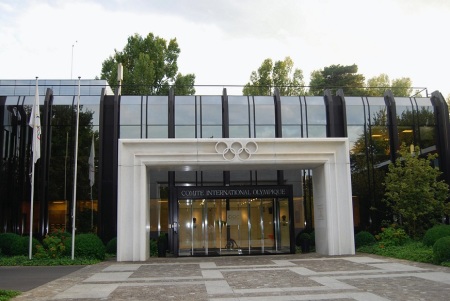New Olympic guidelines open door for relaxed rules on trans athlete participation

The International Olympic Committee has amended its policy to no longer require each sport federation to gauge trans-identified athletes’ eligibility based on testosterone levels, giving individual sports some leeway to implement their own rules.
The IOC released a “Framework on Fairness, Inclusion and Non-Discrimination on the Basis of Gender Identity and Sex Variations” Tuesday.
“It must be in the remit of each sport and its governing body to determine how an athlete may be at a disproportionate advantage against their peers, taking into consideration the nature of each sport,” the document declared.
The guidance includes 10 overarching principles, including nondiscrimination and “fairness.”
The nondiscrimination principle asserts that “[a]thletes should be allowed to compete in the category that best aligns with their self-determined gender identity” as long as they meet eligibility criteria issued by the sports organization in which they wish to compete.
While the document states that “criteria to determine disproportionate competitive advantage may, at times, require testing of an athlete’s performance and physical capacity,” “no athlete should be subject to targeted testing because of, or aimed at determining, their sex, gender identity and/or sex variations.”
The document’s “fairness” principle requires eligibility criteria for men’s and women’s sports to provide “confidence that no athlete within a category has an unfair and disproportionate competitive advantage (namely an advantage gained by altering one’s body or one that disproportionately exceeds other advantages that exist at elite-level competition).”
To issue restrictions for eligibility, the framework also calls for the implementation of “an evidence-based approach” as documented in “robust and peer reviewed research.”
The research must demonstrate “a consistent, unfair, disproportionate competitive advantage in performance and/or an unpreventable risk to the physical safety of other athletes” and that such “disproportionate competitive advantage and/or unpreventable risk exists for the specific sport, discipline and event that the eligibility criteria aim to regulate.”
The research must be “based on data collected from a demographic group that is consistent in gender and athletic engagement with the group that the eligibility criteria aim to regulate.”
The IOC holds the “primacy of health and bodily autonomy” in high regard. The document contends that competitors “should never be pressured by an International Federation, sports organization, or any other party (either by way of the eligibility criteria or otherwise) to undergo medically unnecessary procedures or treatment to meet eligibility criteria.”
“No athlete should be precluded from competing or excluded from competition on the exclusive ground of an unverified, alleged or perceived unfair competitive advantage due to their sex variations, physical appearance and/or transgender status,” the framework states.
In a statement, the International Olympic Committee indicated that it was “planning a comprehensive roll-out phase, including webinars that may support [international federations] and athletes on this journey, starting after the Olympic Winter Games Beijing 2022.”
The updated guidance replaces guidelines adopted at the November 2015 IOC Consensus Meeting on Sex Reassignment and Hyperandrogenism. Under the 2015 guidance, athletes transitioning from male to female were eligible to compete in women’s sports as long as they met testosterone level requirements for at least 12 months before competing. Additionally, the testosterone level had to remain below that level “throughout the period of desired eligibility to compete in the female category.”
A 43-year-old trans-identified male qualified to compete in women’s weightlifting at the Tokyo Summer Olympics, which took place earlier this year. The athlete was eliminated from the women’s weightlifting competition after failing to record a lift.
In June, an NCAA champion hurdler was ruled ineligible because of an inability to demonstrate that the eligibility criteria had been met.
In 2021, a Canadian soccer player known by the last name Quinn became the first trans-identified and nonbinary athlete to win an Olympic gold medal.
“Far too often, sport policy does not reflect the lived experience of marginalized athletes, and that’s especially true when it comes to transgender athletes and athletes with sex variations,” Quinn said in a statement. “This new IOC framework is groundbreaking in the way that it reflects what we know to be true — that athletes like me and my peers participate in sports without any inherent advantage, and that our humanity deserves to be respected.”
The IOC guidance comes as at least nine U.S. states have passed laws requiring athletes to compete on sports teams that correspond with their biological sex instead of their gender identity.
Critics of policies that allow athletes to compete on sports teams based on gender identity argue that the biological differences between males and females that give men physical advantages.
A study from the British Journal of Sports Medicine published last December suggests that trans-identified males retain advantages over female athletes even after one year of taking “feminizing” hormones.
Sharron Davies, who won a silver medal in the 400-meter individual medley at the 1980 Olympics in Moscow, criticized the move.
“After 2 decades of the IOC ignoring DDR situation & letting down female athletes we are here again with a cowardly passing of the buck!” she wrote on Twitter. “How can testosterone be on the drug ban list but not an issue if born male in female sport? Men get fair sport women not.”
Author Abigail Shrier, whose book criticizes the “transgender craze,” also took to Twitter to voice her objection.
“We need to have a serious discussion about withdrawing our female athletes from the Olympics if this foolish, extreme, and unjust policy is allowed to stand,” she wrote. “America has invested too much in the development of our female athletes to submit them to this.”
Ryan Foley is a reporter for The Christian Post. He can be reached at: ryan.foley@christianpost.com





















